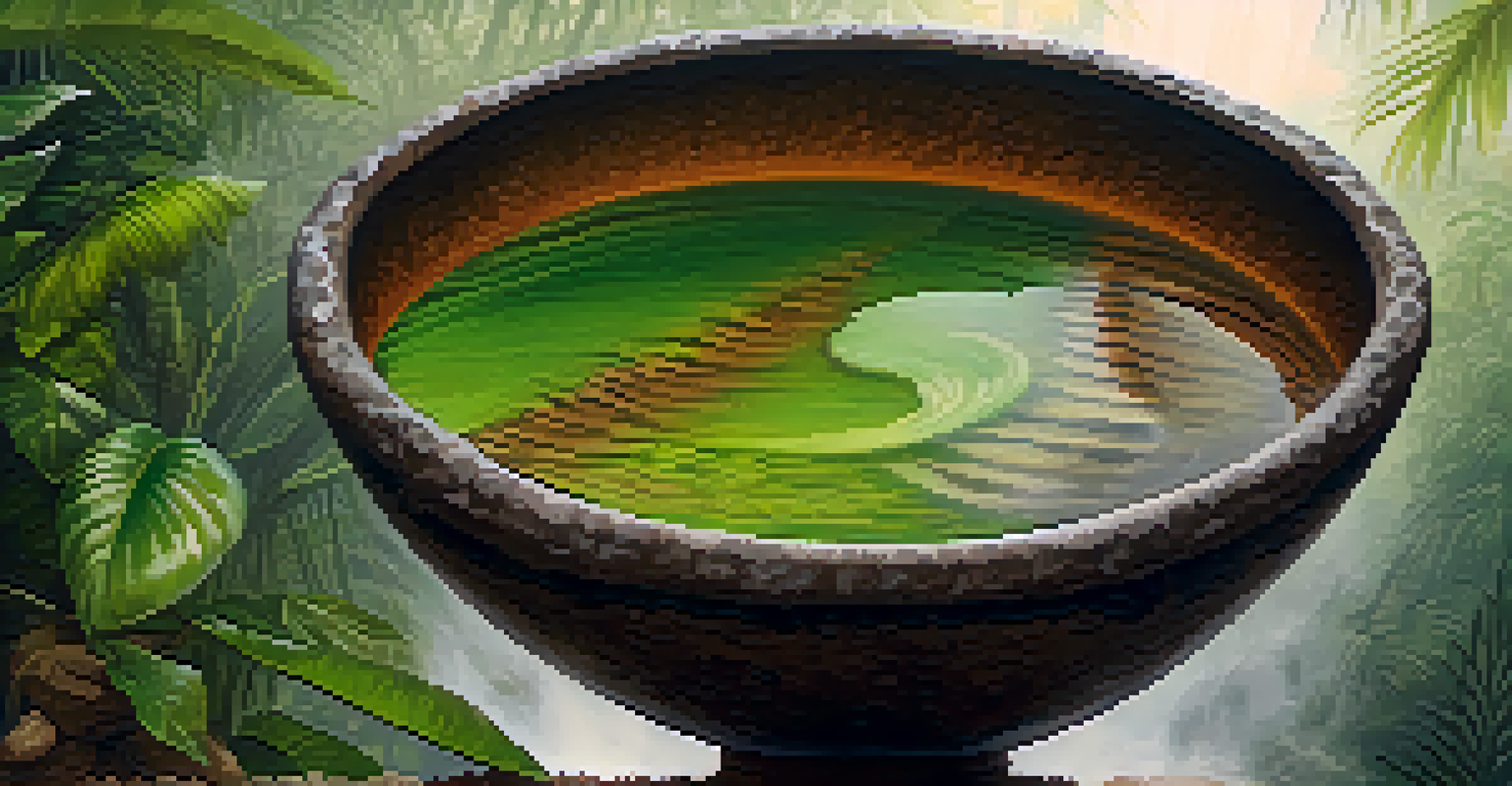Cultural Contexts of Ayahuasca and Therapeutic Relationships

Understanding Ayahuasca: Origins and Cultural Significance
Ayahuasca is a traditional brew originating from the Amazon rainforest, used for centuries by Indigenous communities. Its primary ingredients, the Banisteriopsis caapi vine and the Psychotria viridis leaf, create a powerful psychoactive experience. This journey is not only physical but deeply spiritual, as it connects users to their cultural roots and ancestral wisdom.
Ayahuasca is a tool for personal transformation, but it requires respect for its origins and the cultures that have long used it.
For many Indigenous tribes, Ayahuasca ceremonies are sacred rituals that promote healing and community bonding. They believe that the brew can facilitate communication with spirits and provide insights into life’s challenges. This cultural context shapes how participants approach the experience, emphasizing respect and intention.
As interest in Ayahuasca grows globally, it’s essential to acknowledge these cultural origins. Misappropriation or commercialization can dilute its significance, making it crucial to approach Ayahuasca with an understanding of its heritage and purpose.
The Therapeutic Potential of Ayahuasca
Recent studies suggest that Ayahuasca may offer therapeutic benefits, particularly for mental health issues like depression and PTSD. The brew’s psychoactive compounds can lead to profound introspective experiences, often helping individuals confront and process trauma. This therapeutic potential is a key factor in its growing popularity outside traditional settings.

Participants often report feelings of interconnectedness, which can foster a sense of belonging and support during the healing process. The communal aspect of Ayahuasca ceremonies allows individuals to share their experiences, creating a supportive environment for emotional release. This shared journey can enhance the therapeutic effects, reinforcing the idea that healing is often a collective experience.
Cultural Roots of Ayahuasca
Ayahuasca is a sacred brew with deep cultural significance among Indigenous communities, emphasizing the need for respect and understanding.
However, it’s essential to approach Ayahuasca with caution, ideally under the guidance of experienced facilitators. The emotional intensity of the experience can be overwhelming, and having a supportive therapeutic relationship is crucial for navigating these challenges safely.
The Role of Shamans in Ayahuasca Ceremonies
In traditional Ayahuasca ceremonies, shamans play a pivotal role as guides and healers. They are often seen as intermediaries between the spiritual and physical worlds, helping participants navigate their journeys. Their extensive knowledge of the brew and its effects allows them to tailor the experience to individual needs.
The Ayahuasca experience is a journey into the depths of the soul, revealing the interconnectedness of all beings.
Shamans typically employ various rituals, chants, and songs, known as icaros, to create a conducive environment for healing. These practices are steeped in tradition and are believed to enhance the effects of the brew while providing spiritual protection. This deep-rooted connection to the ritual underscores the importance of cultural context in the Ayahuasca experience.
Working with a shaman can significantly impact the therapeutic relationship, providing a sense of safety and trust. Participants often feel more at ease knowing they are under the care of someone experienced in navigating the complexities of the Ayahuasca journey.
Cultural Appropriation vs. Respectful Engagement
As Ayahuasca becomes more popular in Western societies, concerns about cultural appropriation arise. Many Indigenous communities emphasize the need for respect and understanding when engaging with their sacred practices. This calls for a careful balance between curiosity and cultural sensitivity, ensuring that the traditions are honored.
Respectful engagement involves acknowledging the origins of Ayahuasca and the significance it holds within Indigenous cultures. It also means supporting Indigenous-led initiatives and educational programs that promote awareness of their practices. By fostering respectful dialogues, participants can learn from these cultures rather than exploit them.
Therapeutic Benefits Explored
Research indicates that Ayahuasca may aid in healing mental health issues like depression and PTSD through profound introspective experiences.
Ultimately, the goal is to create a space where both Indigenous wisdom and modern therapeutic practices can coexist. This approach not only enriches the Ayahuasca experience but also fosters mutual respect and understanding between cultures.
Integration: Making Sense of the Ayahuasca Experience
After an Ayahuasca ceremony, the process of integration is crucial for participants. This involves reflecting on the insights gained during the experience and finding ways to incorporate them into daily life. Integration can help solidify the benefits of the journey, turning fleeting moments of clarity into lasting change.
Many individuals choose to seek support from therapists or integration coaches who understand the unique challenges posed by Ayahuasca experiences. These professionals can provide guidance on processing emotions, navigating relationships, and making lifestyle changes that align with newfound insights. This supportive relationship can enhance the healing process.
Moreover, integration circles, where participants share their experiences, can be invaluable. These gatherings foster community and support, allowing individuals to connect over shared journeys and learn from one another’s perspectives.
Ethical Considerations in Ayahuasca Use
Engaging with Ayahuasca raises important ethical considerations, particularly regarding consent and the well-being of participants. It’s vital that individuals are fully informed about what to expect before participating in a ceremony. This transparency helps ensure that everyone involved is prepared for the emotional and psychological challenges that may arise.
Additionally, the safety and health of participants should always be a priority. This includes screening for medical contraindications and providing a supportive environment. Ethical facilitators will prioritize the care and safety of participants, fostering an atmosphere of trust and respect.
Importance of Ethical Practices
Engaging with Ayahuasca requires ethical considerations, including informed consent and participant safety, to ensure a responsible experience.
Ultimately, ethical engagement in Ayahuasca ceremonies enhances the therapeutic relationship and promotes responsible use of this powerful brew. By prioritizing ethics, we can help ensure that the healing potential of Ayahuasca is realized in a respectful and beneficial manner.
Personal Stories: Transformative Journeys with Ayahuasca
Many participants share transformative stories of their experiences with Ayahuasca, highlighting its potential for personal growth and healing. These narratives often include confronting deep-seated fears, gaining clarity on life choices, and feeling a profound sense of connection to others and the universe. Such stories illustrate the powerful impact Ayahuasca can have on individuals seeking change.
For instance, one individual might recount how Ayahuasca helped them confront childhood trauma, leading to a newfound sense of self-worth and freedom. Another may share their journey of self-discovery, finding purpose and direction after feeling lost for years. These personal accounts serve as testaments to the brew's potential to facilitate deep healing.

However, it's important to remember that each journey is unique, and experiences can vary widely. Not every story will be one of success; some may reveal challenges or unexpected emotions. This diversity of experiences underscores the complexity of the Ayahuasca journey and the importance of approaching it with an open mind.